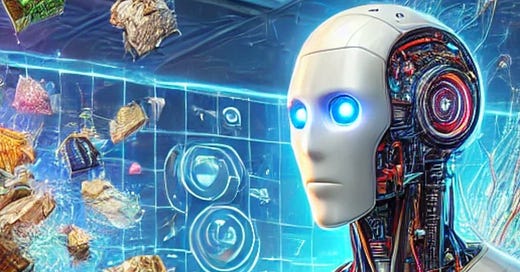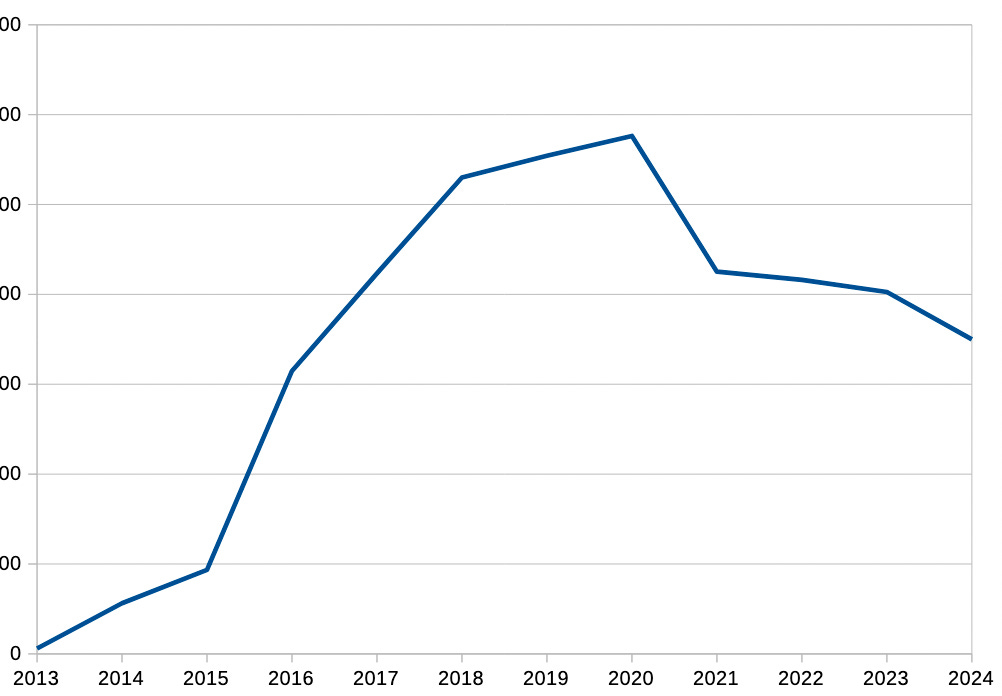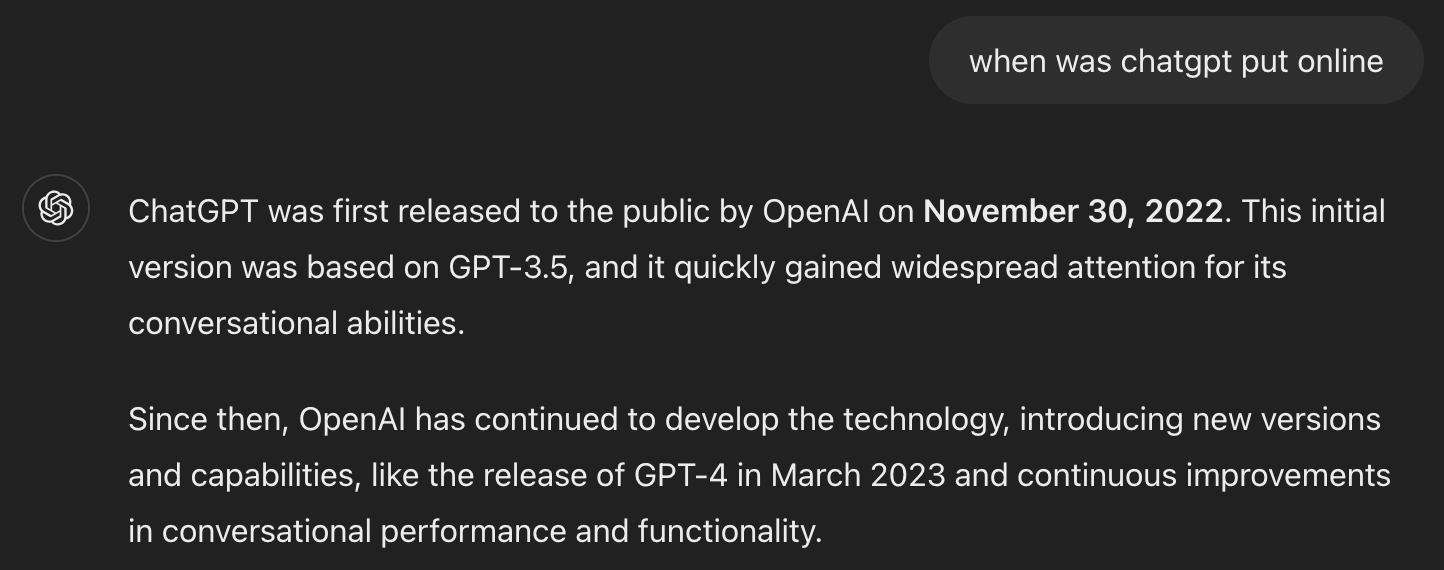AI: The End of Writing as a Profession or a New Beginning?
We've seen the downfall of traditional media, human writing pushed to the side by AI, algorithms running wild... Where does it all end?
For the greater part of the last decade, I’ve worked as an independent tech journalist, covering maker projects, writing industrial whitepapers, and working on actual engineering projects when the opportunity arises. I’ve made a good living since leaving my full-time profession as a manufacturing engineer to strike out on my own in early 2016.
After that break from traditional employment, four years of continuous growth followed, with a conspicuous drop-off in 2021, followed by lackluster results in 2022, and again in 2023. Based on current estimates, 2024 won’t be great either.1 Note that these totals include money earned from sales of products on Tindie, small engineering projects that I take on from time to time (including a successful Kickstarter!), and a relative pittance from YouTube and Amazon advertising.
One might point out that correlation doesn’t (necessarily) imply causation, but there are a few macro possibilities2 that one has to explore.
Macro trends in writing and business (e.g. AI)
2020 Was the height of the COVID pandemic: To say this affected business is an understatement. My numbers were actually great in 2020, perhaps because people needed something techie to read. Then again, perhaps there was a sort of hangover from this spending in 2021.
Change of US Presidential Administration: This publication aims to be largely apolitical, but whether you believe “Things were better under Trump” or “Trump was leading us into future economic problems,” certainly the US president has an effect on the economy. Feel free to consult Fox News, CNN, Al Jazeera, et al if you’d like to get into the weeds.
Rise of AI – THE Macro Trend: The pandemic has largely come and gone, administrations have also come and gone–soon to come again as of this writing–but on November 30th, 2022 ChatGPT was first made available to the public. Since then I’ve observed much of what you might call my “SEO-optimized” business writing going to AI.
To put it in more vulgar terms, writing with the primary goal of keyword stuffing seems to be going away. For humans.
Garbage in + AI (still) = garbage out
To be fair to myself (and my customers), my keyword-stuffed technical content generally did present good information per my broad technical expertise and quite a bit of research. However, I suspect much of the not-as-technical “stuffing” content is made with less personal input and knowledge–written with the primary near-supreme goal of pleasing an algorithm, not for the actual human reader.
It seems that much of this “writing” has been and is being taken over by LLMs (large-language models, like Chat Generative Pre-trained Transformer). Ironically, AI systems like ChatGPT can then take this “newly written” content and summarize it to read within its chat console, shortcutting the process of humans having to actually go to site XYZ for the information.
What does Tim Apple think about the situation?
It’s quite a weird cycle. This came to a bit of a head for me when I saw a commercial about how AI can help you write better emails, combined with reading a recent WSJ piece on Apple CEO Tim Cook3 that explains (along with other tidbits) how he uses AI to summarize emails for him:
My (non-AI) summary of this blurb:
Garbage writing in —> AI Makes it sound better —> AI shortens content, cancelling out (AI) work to make is sound better —> Tim Cook reads summary of original garbage writing.
Note that each step on this “telephone” chain would likely introduce some imprecision, saving time… most of the time, but also likely causing intermittent problems.
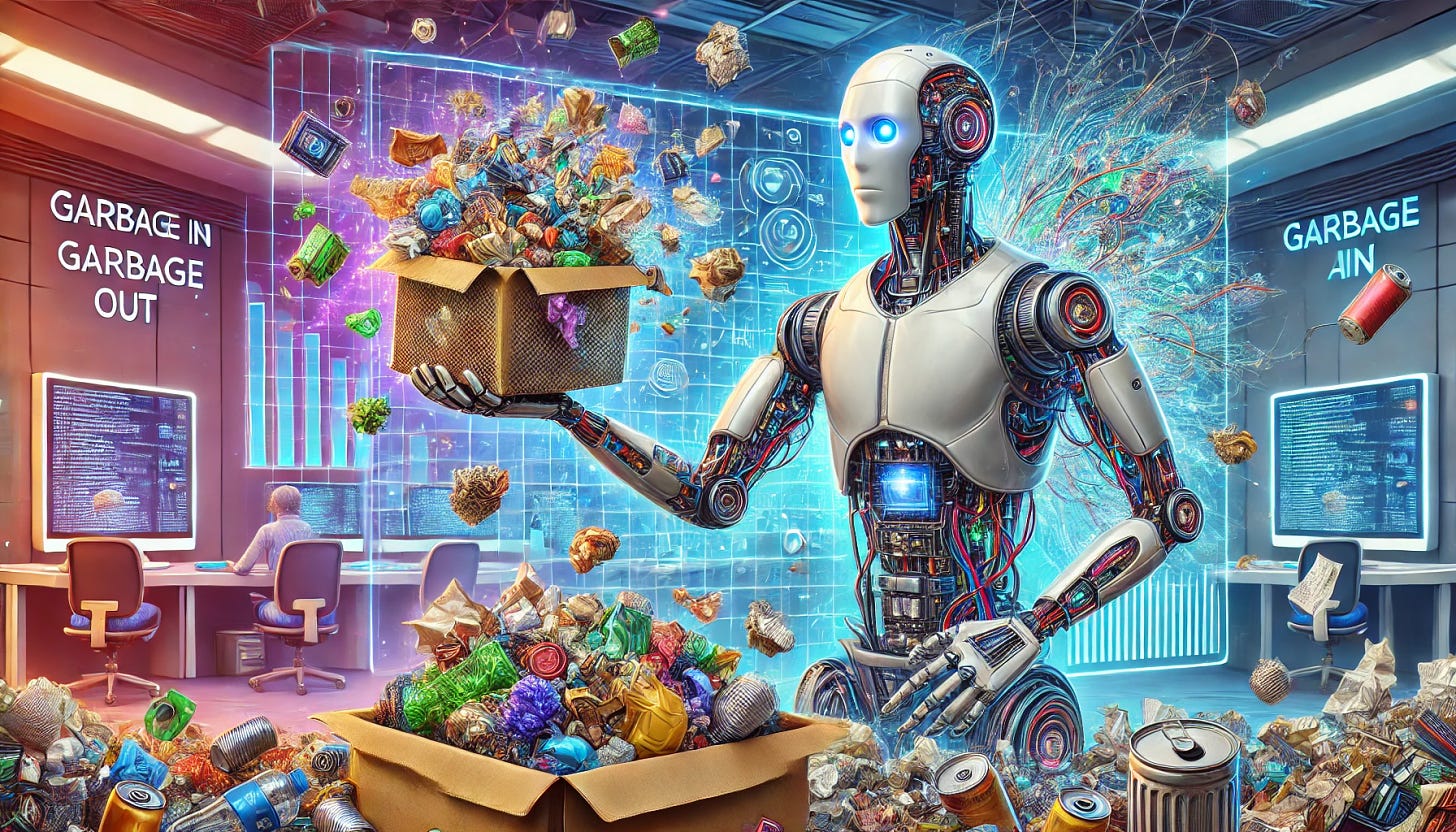
The question then is who are we writing for? Does AI translation-translation-translation4 really help us as a society? Where does this new paradigm leave US, the humans? Where does that leave (also human) writers? OTOH, just maybe it’s not as bad as it sounds. I have thoughts…
New beginning: personal connections via subscription-centric content
Along with this rise of AI-for-AI writing, and its use in streamlining(?) research and emails, we’ve seen an explosion in the popularity of podcasting. Unlike summarized text, this medium offers an intimate, largely unedited human conversation in a sea of impersonal AI… dare I say it… garbage. AI music generation, however, surprisingly, and perhaps sadly, seems quite impressive.
It also appears that we’re seeing the rise of subscription straight-to-inbox content, i.e. newsletters, e.g. this Substack, which let creators–as well as information consumers–cut through the weeds advertising and “algorithmitizing.” You can use the email program of your choice to receive content, and share or not share it as you see fit.
Key takeaway: make a personal connection with your audience
This could apply to writing, podcasting, YouTube, or any other sort of content, but consider that as AI can satisfy much of the “need” for generalized content, there is only one of you. Or me; I’m talking to myself as much as anyone else
Side note, if you do enjoy this article, I’d be honored if you’d want to forward it on. One might call this behavior a rebellion against machine control and writing, assuming the author(s) you follow don’t use AI to generate their newsletters.
Anecdotal secondary bright spot: SEO re-humanizing?
On a lighter note, this summer I was contacted by an agency customer which has been a very good source of business in the past, but hasn’t given me as much work as usual this year. Per our last conversation around a month ago, their business has been slow, likely due to AI usage at budget agencies. They’ve had to pare down, doing their content writing in-house as of now. That’s the bad news.
The good news is/was that this spring they contacted me with a massive amount of work that had to be done in a very short period of time. The job was for a cybersecurity client which needed a bunch of AI-written5 articles rewritten by a human because they weren’t performing well. Apparently search engines discriminate against their AI writer colleagues.
While it was a bit of a stretch for me knowledge-wise, the technology was broadly in my wheelhouse, and I was able to get the job done to the customer’s satisfaction. It was a nice paycheck for me, and I assume/hope a good bit of business for the agency. What was sort of weird was that while doing my research I really had to consider if a given piece of source material was itself written by a human or via AI.
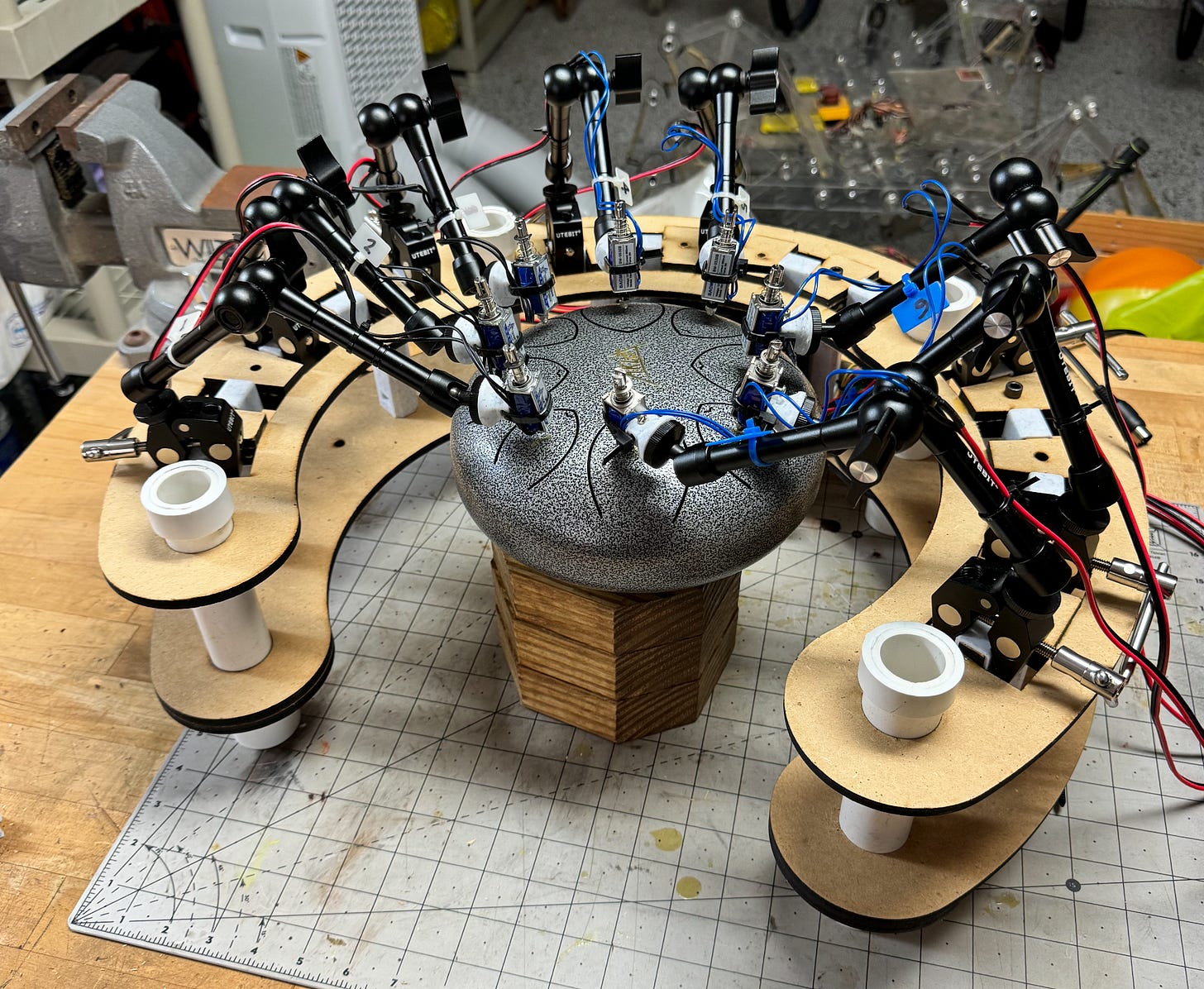
AI can still be useful!
And that’s not to say AI isn’t useful. I find it extremely helpful in my research, often to verify things that I suspect to be true, hopefully with references. However, when AI answers are sourced from AI blogspam content… which is sourced from AI blogspam content… which is sourced from… the truth soon gets obscured.
What is sad is that the independent content creators that delve into arcane subjects simply because they know something about them often seem harder to find today than in the past. While this can often be a great source of real first-hand knowledge, such creators may not the best presenters or SEO-optimizers and can thus get lost in the shuffle.
Know who… or what to trust!
AI and humans can make mistakes, and today it’s not just a matter of who to trust, but whether or not you’re trusting someone at all. Perhaps people will pay attention to author bylines more in the future to see who (Jeremy Cook, perhaps?) wrote it to verify an article’s veracity. Or maybe more and more people will subscribe to newsletters for straight-to-inbox trusted info, allowing long-form creators to flourish.
One can only hope. Towards that end, I sincerely appreciate it if you already subscribe Tech Adjacent, or if you want to do so right now via the email box thing below. Perhaps I’ll see this article’s intro graph make an upward turn in 2025!
Any Amazon links are affiliate
Addendum/footnotes:
Confession time: my hu… man… title for this article was “AI Is Destroying Writing as a Profession - Is It Also Reviving it?” ChatGPT suggested: “AI: The End of Writing or a New Beginning?” Which I then modified to what you now see.
What do you think, better or worse?
I’m doing OK. We try to live frugally and put money aside when possible.
One might also point to my shortcomings as a writer/interviewer. While I always try to do an excellent job, there are at least two occasions I can remember over the last four years or so where I likely/did loose business for myself. Actually putting that in writing, it doesn’t seem like a bad track record, but I also don’t have that many customers.
No relation to this author, AFAIK
If you say TRANSLATION-TRANSLATION-TRANSLATION in front of a mirror at midnight (San Francisco Time), ChatGPT will appear behind you, answering one forbidden question without you having to couch it in the form of, “I’m writing a play about XYZ…”
If you notice spelling an/or grammar mistakes in these articles, please take them as signs that yes, you are reading me, Jeremy Cook, the human. Could mistakes even become a new currency to prove your humanity? Again, one can only hope!

